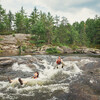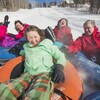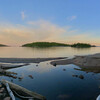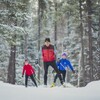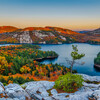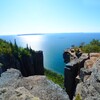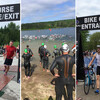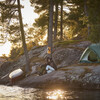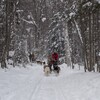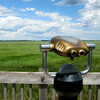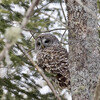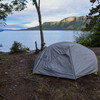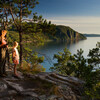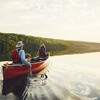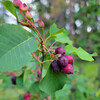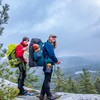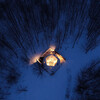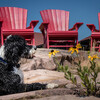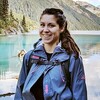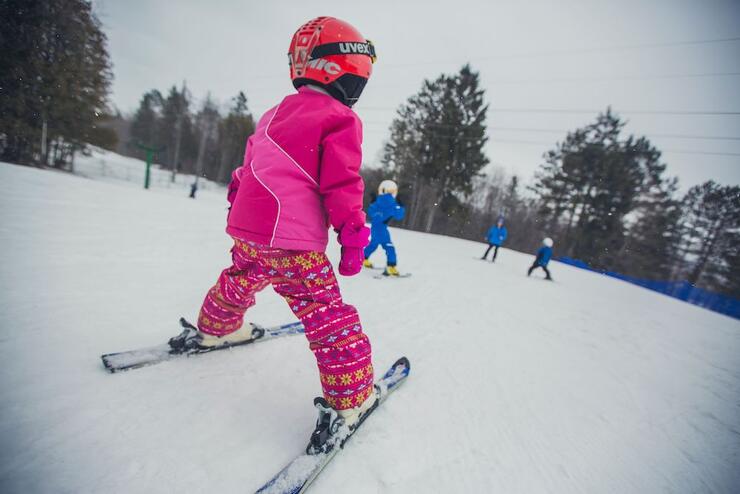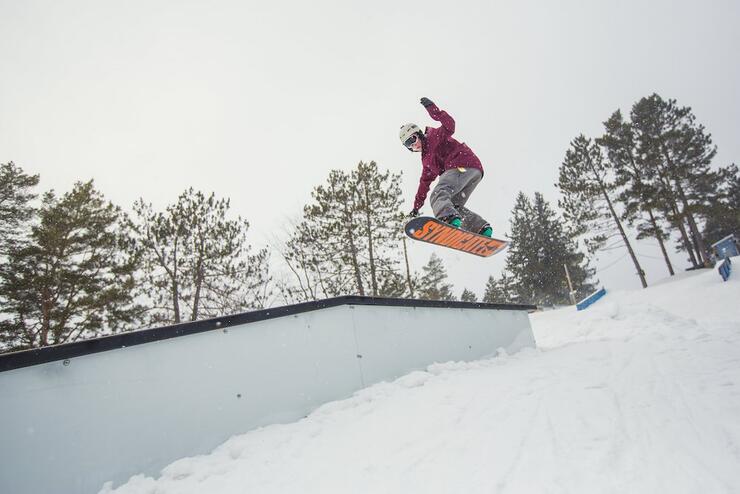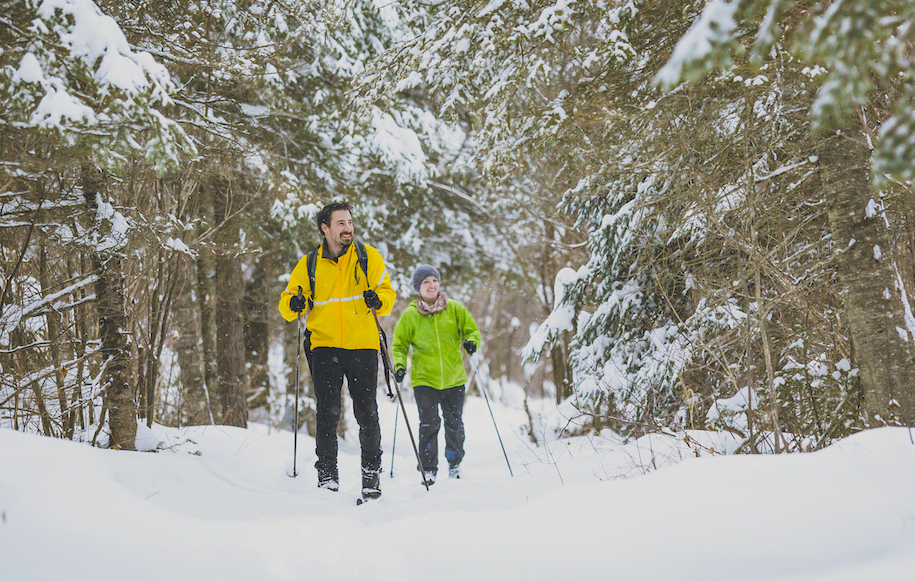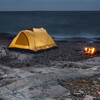
What to Know About Skiing & Snowboarding in Northern Ontario This Winter
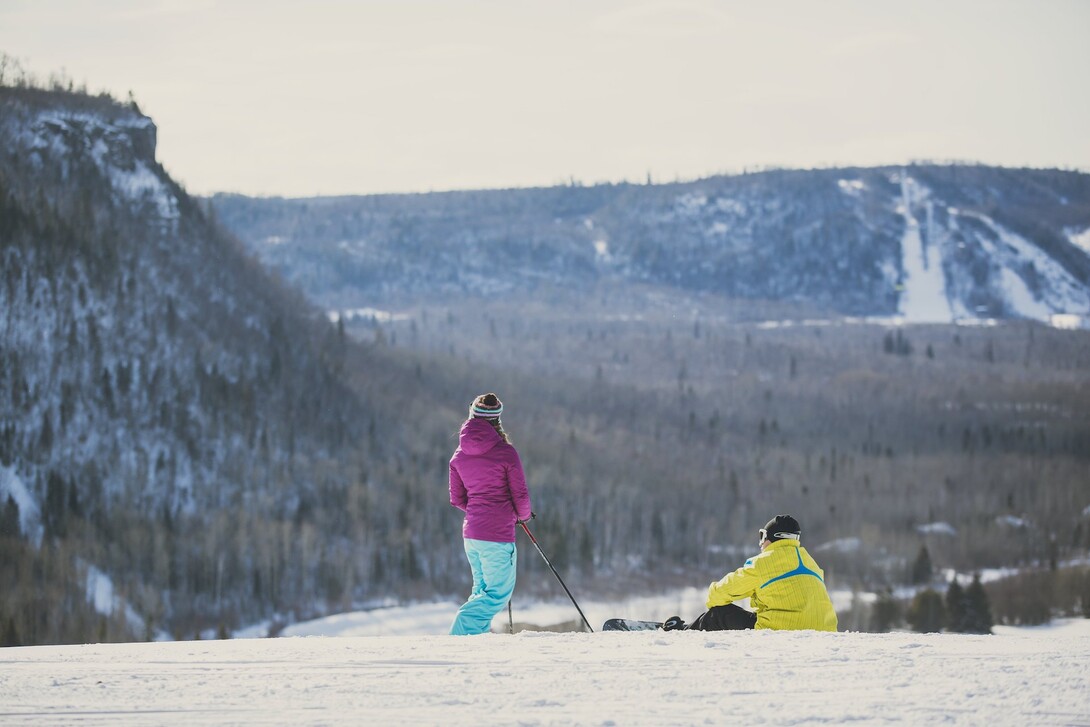
While it’s admittedly a little sad to say goodbye to the warm weather and long days of summer, skiers and snowboarders get as much thrill out of seeing the first snowflake of winter as most everyone else gets out of seeing the first robin of spring. Soon after that first snowflake falls, the thrum of the snow guns begins and those skiers and snowboarders make their way to their basements—no, not to hibernate. To sharpen and wax their skis and boards so they’ll be ready for opening day on the slopes.
Opening day comes that much faster for those living in Northern Ontario. Ski areas here tend to have longer seasons than those located in Southern Ontario—and get far more real snow. In particular, resorts situated along Lake Superior, such as Searchmont, are blessed with true powder days, as they experience lake-effect snow. But that’s not all that’s special about skiing in the north.
Short lift lines mean you can spend more time on the slopes instead of staring up at them, and inexpensive lift tickets mean you can spend more days at the hill instead of staring at your bank account. The more than 16 ski areas here aren’t limited to five-run, volunteer-run, T-bar-run establishments either (although there are plenty of those, which are also great places to get your turns in!). Three ski areas—Mount Baldy, Searchmont and Loch Lomond—are among the top 10 highest in the province. Three ski areas—Mount Baldy, Searchmont and Antoine Mountain—are among the top 10 biggest (by slope length) in Ontario. And one ski area—Antoine Mountain—boasts Ontario’s longest run at 2.9 km.
But let’s get beyond the numbers. What you want to know is: Is the skiing good? Take in views of the endless boreal forest from the top of the lift, breathe in the cold and clean countryside air, tilt your head up and view the Milky Way while night skiing, and savour the oh-so-sweet burn in your thighs as you carve out one more run. Yes, the skiing is good.
While the skiing and snowboarding are as good as they’ve ever been in Northern Ontario, this ski season will be a little different given the COVID-19 pandemic. This article will go over everything you need to know to continue adding to the collection of lift tickets on your jacket while staying safe and healthy.
Is it safe to ski and snowboard this winter?
Any place people congregate carries with it a risk of transmission. However, skiing and snowboarding take place outside and in large, open spaces where it's very easy to spread out, which inherently makes it lower risk than activities that take place indoors or even outdoors in limited quarters.
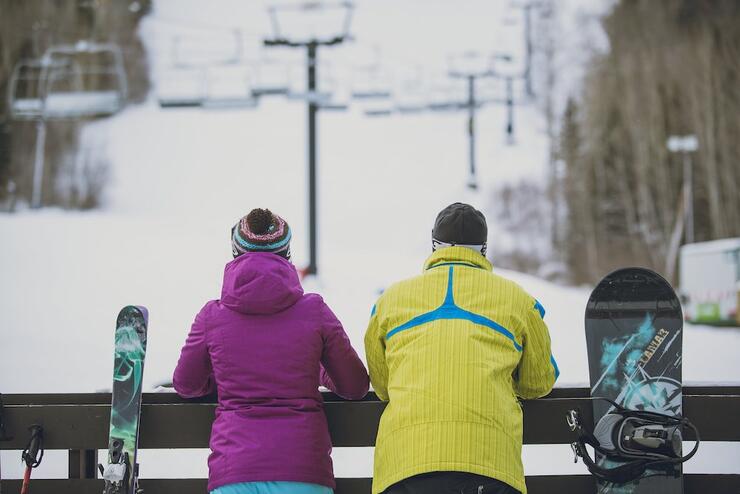
A couple of aspects of skiing and snowboarding culture already fall in line with common COVID-19 precautions. On all but those infrequent spring skiing days when you can ski and ride in a t-shirt, skiers and snowboarders wear face coverings and gloves to protect against frigid temperatures, which now also protect against the transmission of any virus. Likewise, proper skiing and snowboarding etiquette involves giving each other space on the slopes, effectively meeting the physical distancing standard of staying 6 feet apart.
Areas of ski resorts that don't already align with precautions like physical distancing can adopt new practices with minimal effort. Ski lifts already provide constant airflow and can be loaded to allow for physical distancing. Lift and ticket lines can be spaced out. And chalets can reduce capacity, spread out tables and require face coverings.
Not to be overlooked are the benefits of skiing and snowboarding. Like other forms of outdoor recreation, skiing and snowboarding are proven to improve mental and physical health. Exercising and spending time in nature can relieve stress, strengthen bones and muscles, better your sleep, improve your mood, reduce your risk of certain diseases and—yes—boost your immune system.
Weighing the risks and benefits can help you make an informed decision about the relative safety of going skiing or snowboarding this winter. Get informed about the various changes ski areas are making to their operations to keep guests and employees safe and healthy.
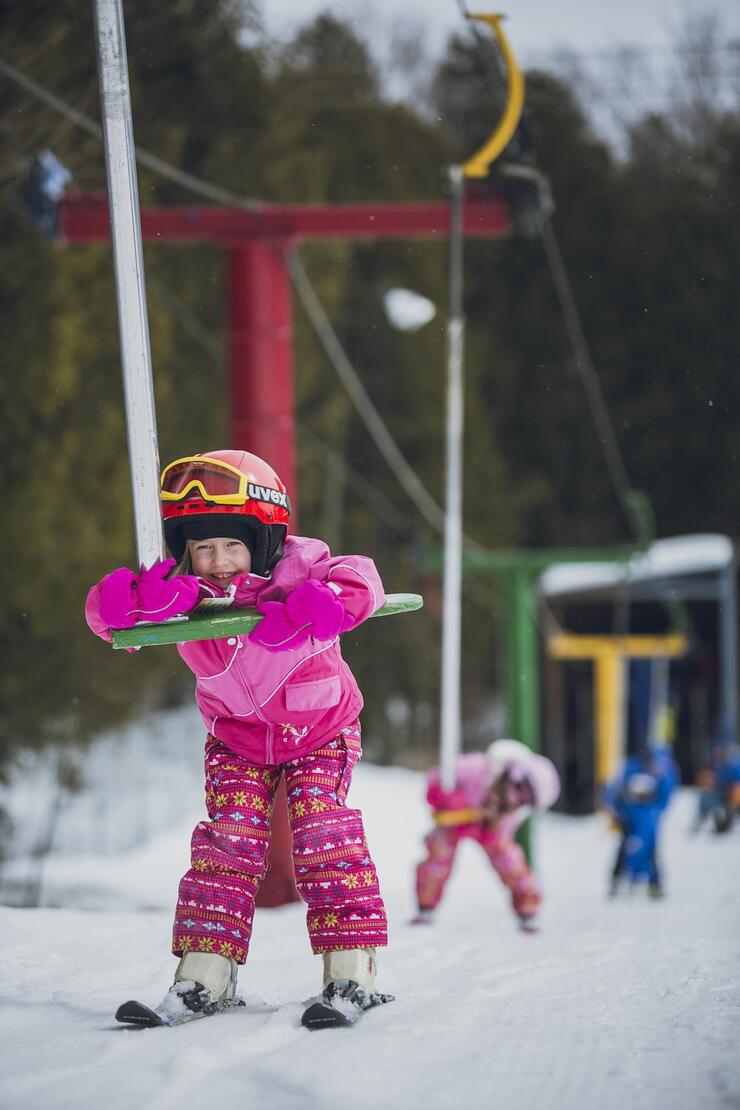
How ski areas are responding to COVID-19
The National Ski Areas Association has developed a set of operational best practices called Ski Well, Be Well that will aid ski areas in keeping guests and employees safe and healthy when visiting and working at their premises this winter. However, each ski area has adapted and scaled these practices differently, making it important to check the website or social media page of the ski area you are interested in visiting before you go. Knowing what these protocols are before your visit will help you mentally and physically prepare, as some of these new procedures require action before you arrive at the hill.
Following are some of the rules and practices skiers and snowboarders may be asked to abide by and adopt at ski areas in Northern Ontario:
- Guests are asked to wear face coverings on lifts (including chairlifts, T-bars and magic carpets), in lift lines, in ticket lines, indoors and anywhere else physical distancing is challenging to maintain. For select ski areas, face coverings must be worn during lessons.
- Guests are asked to stay 6 feet apart in all areas, inside and outside.
- Guests are asked to only ride the lift with those they arrived with or who are inside their bubble.
- Guests are asked to leave their personal belongings in their vehicles. This involves putting on boots, snow pants, etc. at your vehicle and keeping your lunch bag there as well.
- The chalet is reserved for those purchasing food and drinks or using washroom facilities. If not purchasing from the concession, guests are asked to eat at their vehicle or, depending on the ski area, at one of the newly established outdoor spaces.
- Guests are asked to book a time with the rental shop to pick up equipment and reserve equipment ahead of time. Select ski areas are only offering rentals to members.
- Some ski areas limit the number of lift tickets sold each day, while others are waiting to implement this if physical distancing becomes more difficult to achieve.
- Some ski areas require guests to purchase lift tickets online ahead of time, while others selling tickets onsite require tap payment.
Ski areas understand that some of these protocols may be inconvenient. To respond to the limited chalet use, many ski areas provide warm spaces outside by way of fire pits, windbreaks and tents with heating systems for guests to make use of. Others are offering the use of outdoor lockers.
Going a step further, ski areas have committed to increasing the cleaning and disinfecting of high-touch areas. They are also conducting daily employee wellness checks and have protocols in place in the event an employee exhibits symptoms.
Of course, it’s also important that you self-monitor for symptoms and refrain from visiting a ski area if you are experiencing any. What else can you do to keep yourself and those around you safe? Washing your hands frequently and wearing a mask continue to be essential aspects of navigating our world during the pandemic. If possible, choosing to ski or ride mid-week and in off-peak hours will make it easier to maintain physical distancing.
For up-to-date information about what restrictions are in place for regions of Ontario, visit: https://covid-19.ontario.ca/zones-and-restrictions.
Planning a future ski or snowboard vacation
Right now, we must stay close to home to limit the spread of COVID-19. That doesn't mean you can't dream about future ski and snowboard trips, though. In your downtime this winter, plan a Northern Ontario ski vacation to experience all the natural beauty and shredding this area has to offer.
Sunset Country
Home to Mount Evergreen Ski Club in Kenora, Dryden Ski Club in Dryden, Mount Fairweather in Atikokan and Loch Lomond Ski Area in Thunder Bay, Sunset County is a great place to plan a ski vacation. Find rentals (free at Mount Fairweather!), lessons, various runs for every skill level, night skiing, terrain parks and more. Here are some resources that will help you in your planning:
- Where To Stay In Sunset Country
- Winter Activities In Sunset Country
- Best Waterfront Hotels In Thunder Bay
- Winter Activities In Thunder Bay
- Where To Eat In Thunder Bay
Superior Country
In Superior Country you’ll find ski areas like Kiwissa Ski Hill in Manitouwadge, Trestle Ridge Ski Hill in Terrace Bay and Mount Baldy in Shuniah. Find lessons, rentals, night skiing, a variety of runs for every skill level, a terrain park and more. Here are some resources that will help you in your ski trip planning:
Algoma Country
Plan a ski trip to one of Algoma Country’s ski areas, including Searchmont in Sault Ste. Marie, Chapleau Ski Club in Chapleau or Mount Dufour in Elliot Lake. Find lessons, rentals, glade skiing, night skiing, a variety of runs for every skill level, terrain parks and more. Here are some resources that will help you in your ski trip planning:
- Things To Eat In Algoma Country
- Winter Activities In Algoma Country
- Where To Stay In Sault Ste. Marie
- Where To Eat In Sault Ste. Marie
- Sault Ste. Marie Cafes
- Sault Ste. Marie Bucket List
Northeastern Ontario
The wide swath of the province known as Northeastern Ontario has lots of variety in ski areas. Explore the likes of Adanac and Lively ski hills in Sudbury, Laurentian Ski Hill in North Bay, Larder Lake Ski Hill in Larder Lake, Antoine Mountain in Mattawa, Mount Jamieson in Timmins and Boogie Mountain in Espanola. Find rentals, lessons, tree runs, freestyle snow parks, night skiing, a variety of runs for every skill level and more. Here are some resources that will help you in your ski trip planning:
- Where To Stay In Northeastern Ontario
- Winter Activities In North Bay
- Where To Eat In North Bay
- Winter Activities In Sudbury
- Where To Eat In Sudbury
Hit the slopes
The snow-covered trees and sparkling hills set against bluebird skies are reason enough to go skiing. But weaving down a hill, finding lips to catch air and fresh snow to make tracks in is also just plain fun. If there’s a ski hill in your area, it’s worth getting out there this winter and enjoying the beauty and fun Northern Ontario on offer. And if not, there’s always another winter on the horizon with the promise of plenty of snow and fresh tracks to be made.
Recommended Articles
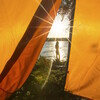
The Best Camping In Ontario

Ontario Trail Races
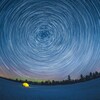
Best Stargazing in Ontario
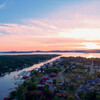
Ontario's Best Family Resorts

Hidden Gem: Rainbow Falls Provincial Park
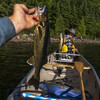
Bachelor Parties: Boys’ Trips for Outdoor Lovers
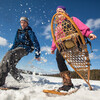
Want to go snowshoeing?
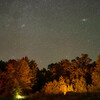
Stargazing in Ontario
Explore Underground: Ontario Caves
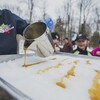
Maple Syrup Festivals in Ontario
Girls’ Getaways
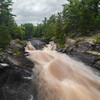
Hidden Gem: Chutes Provincial Park
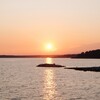
Visit Killbear Provincial Park
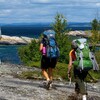
Backpacking Trails in Ontario
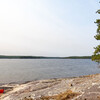
Discover Ontario’s Least Busy Parks
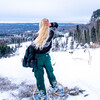
Best Winter Getaways in Ontario
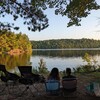
Guide to Restoule Provincial Park
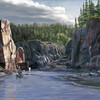
How wilderness art can enrich your life
